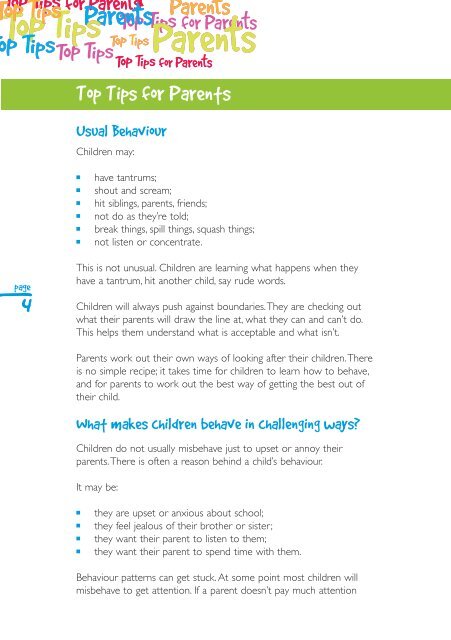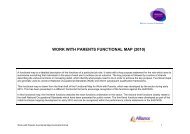YOUR GUIDE TO POSITIVE PARENTING - Parents Advice Centre
YOUR GUIDE TO POSITIVE PARENTING - Parents Advice Centre
YOUR GUIDE TO POSITIVE PARENTING - Parents Advice Centre
Create successful ePaper yourself
Turn your PDF publications into a flip-book with our unique Google optimized e-Paper software.
page<br />
4<br />
Top Tips for <strong>Parents</strong><br />
Usual Behaviour<br />
Children may:<br />
■ have tantrums;<br />
■ shout and scream;<br />
■ hit siblings, parents, friends;<br />
■ not do as they’re told;<br />
■ break things, spill things, squash things;<br />
■ not listen or concentrate.<br />
This is not unusual. Children are learning what happens when they<br />
have a tantrum, hit another child, say rude words.<br />
Children will always push against boundaries.They are checking out<br />
what their parents will draw the line at, what they can and can’t do.<br />
This helps them understand what is acceptable and what isn’t.<br />
<strong>Parents</strong> work out their own ways of looking after their children.There<br />
is no simple recipe; it takes time for children to learn how to behave,<br />
and for parents to work out the best way of getting the best out of<br />
their child.<br />
What makes children behave in challenging ways?<br />
Children do not usually misbehave just to upset or annoy their<br />
parents.There is often a reason behind a child’s behaviour.<br />
It may be:<br />
■ they are upset or anxious about school;<br />
■ they feel jealous of their brother or sister;<br />
■ they want their parent to listen to them;<br />
■ they want their parent to spend time with them.<br />
Behaviour patterns can get stuck. At some point most children will<br />
misbehave to get attention. If a parent doesn’t pay much attention






